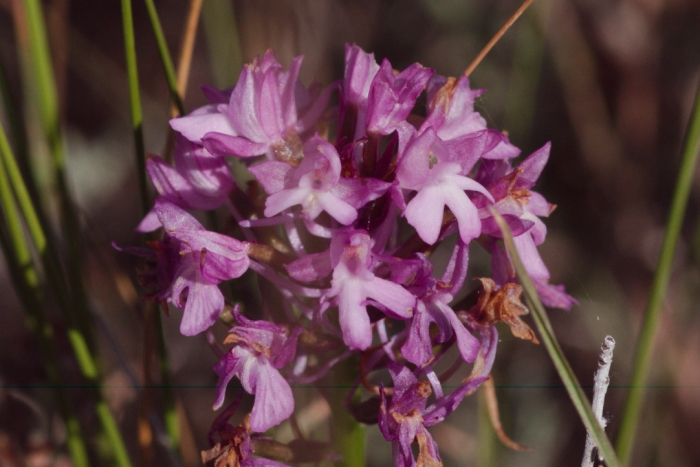Pyramidal Orchid
(Anacamptis pyramidalis)
Pyramidal Orchid (Anacamptis pyramidalis)
/
/

© Benoit NABHOLZ
CC BY-SA 4.0
Image By:
© Benoit NABHOLZ
Recorded By:
Copyright:
CC BY-SA 4.0
Copyright Notice:
Photo by: © Benoit NABHOLZ | License Type: CC BY-SA 4.0 | License URL: http://creativecommons.org/licenses/by-sa/4.0/ | Uploader: benoitnabholz | Publisher: iNaturalist |


























Estimated Native Range
Summary
Anacamptis pyramidalis, commonly known as Pyramidal Orchid, is a perennial herb that is native to a wide range of habitats across southwestern Eurasia, including Mediterranean dry grasslands, garrigues, coastal dunes, and sub-steppic grasslands. It is particularly adapted to calcareous soils and can be found at elevations up to 2000 meters. The plant typically grows up to 24 inches tall and is characterized by a distinctive pyramidal spike of densely packed flowers, which bloom from June to July. The flowers range in color from pink to purple and are highly attractive to a variety of pollinators, including bees and butterflies.
The Pyramidal Orchid is valued for its striking inflorescences and is often used in wildflower meadows and naturalistic plantings. Its ability to thrive in a variety of soil types, including those that are well-drained and calcareous, makes it a versatile choice for gardeners. It prefers full sun but can tolerate partial shade. While it is not commonly used in formal garden settings, it is appreciated for its ease of maintenance and its role in supporting biodiversity. Care should be taken to avoid overwatering, as it can be detrimental to the plant’s health. There are no major disease problems, but slugs and snails may occasionally feed on the leaves.CC BY-SA 4.0
The Pyramidal Orchid is valued for its striking inflorescences and is often used in wildflower meadows and naturalistic plantings. Its ability to thrive in a variety of soil types, including those that are well-drained and calcareous, makes it a versatile choice for gardeners. It prefers full sun but can tolerate partial shade. While it is not commonly used in formal garden settings, it is appreciated for its ease of maintenance and its role in supporting biodiversity. Care should be taken to avoid overwatering, as it can be detrimental to the plant’s health. There are no major disease problems, but slugs and snails may occasionally feed on the leaves.CC BY-SA 4.0
Plant Description
- Plant Type: Herb
- Height: 0.8-1.5 feet
- Width: 0.5-1 feet
- Growth Rate: Slow, Moderate
- Flower Color: Pink, Purple, White
- Flowering Season: Summer
- Leaf Retention: Deciduous
Growth Requirements
- Sun: Full Sun
- Water: Medium
- Drainage: Medium
Common Uses
Border Plant, Butterfly Garden, Low Maintenance
Natural Habitat
Mediterranean dry grasslands, garrigues, coastal dunes, and sub-steppic grasslands
Other Names
Common Names:
Scientific Names: , Anacamptis pyramidalis, Aceras pyramidale, Aceras pyramidalis, Aceras pyramidalis var. brachystachys (d'Urv.), Anacamptis pyramidalis f. albiflora, Anacamptis pyramidalis var. albiflora, Anacamptis pyramidalis var. brachystachys, Orchis pyramidalis,
GBIF Accepted Name: